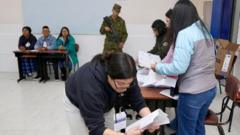Will Chile Choose Between Communist and Far-Right Candidates in the Presidential Run-Off?

Published: 2025-11-17 02:00:10 | Category: world
The upcoming presidential election in Chile will see a run-off vote in December between Jeannette Jara of the Communist Party and far-right candidate José Antonio Kast, following an inconclusive first round on Sunday. The election is significant as it reflects the rising tensions surrounding crime and immigration in Chile, with both candidates pledging to address these issues amid a growing foreign population and concerns over organised crime.
Last updated: 17 October 2023 (BST)
What’s happening now
As of now, Chile finds itself at a political crossroads, with the first round of the presidential election failing to produce a clear winner. Jeannette Jara narrowly led the race, but José Antonio Kast's strong showing positions him as a formidable challenger in the upcoming run-off on 14 December. This election cycle has been marked by a focus on crime and immigration, with both candidates vying to appeal to an electorate concerned about rising crime rates and the impact of immigration on the nation.
Key takeaways
- Jeannette Jara (Communist Party) and José Antonio Kast (far-right) will face off in a December run-off.
- The election campaign has been heavily influenced by issues of crime and immigration.
- Kast may gain support from other right-wing candidates who did not advance.
Timeline: how we got here
The political landscape in Chile has shifted significantly in recent years, culminating in the current election cycle. Key dates include:
- 2017: Chile's foreign population begins to grow, with significant increases in immigration.
- 2021: José Antonio Kast loses the presidential run-off to Gabriel Boric.
- October 2023: First round of the presidential election held, resulting in a run-off between Jara and Kast.
- 14 December 2023: Scheduled date for the presidential run-off election.
What’s new vs what’s known
New today/this week
The recent election results have solidified the run-off between Jara and Kast, with analysts predicting that Kast will benefit from the consolidation of right-wing votes that were previously split among several candidates. This development illustrates a possible shift towards the right in Chilean politics.
What was already established
Prior to the election, it was widely recognised that crime and immigration were pivotal issues driving voter sentiment. Both candidates have been vocal about their intentions to tackle these concerns, with Jara's platform focusing on social welfare and crime prevention, while Kast has advocated for stringent immigration policies.
Impact for the UK
Consumers and households
The outcome of the Chilean election may not have immediate effects on UK consumers, but it could influence international perceptions of immigration policies and governance in Latin America. As Chile is seen as a relatively stable and prosperous nation, shifts towards more hardline approaches could resonate in discussions about immigration and crime in the UK.
Businesses and jobs
For UK businesses with interests in Latin America, particularly in sectors such as mining and agriculture, the election results could impact trade relations. A move towards Kast's far-right policies could lead to stricter regulations on immigration, potentially affecting the labour market and workforce availability in Chile.
Policy and regulation
Should Kast win the presidency, his proposed policies, such as building a border wall and mass deportations, may set a precedent for harsher immigration policies, which could be observed by policymakers in the UK and elsewhere. Conversely, a victory for Jara may promote a more liberal approach to immigration and social policies.
Numbers that matter
- 1.9 million: The current number of foreign residents in Chile, according to the National Migration Service.
- 330,000: Estimated number of undocumented migrants in Chile.
- 9: Number of children José Antonio Kast has, reflecting his family-oriented campaigning style.
Definitions and jargon buster
- Communist Party: A political party that advocates for a socialist system where the means of production are owned and regulated by the community as a whole.
- Far-right: A political ideology that typically includes strong nationalism, anti-immigration policies, and a desire to maintain traditional social orders.
- Undocumented migrants: Individuals who reside in a country without legal permission.
How to think about the next steps
Near term (0–4 weeks)
As the run-off approaches, both candidates will likely ramp up their campaign efforts, targeting undecided voters and those who supported eliminated candidates. Voter turnout will be crucial in determining the outcome.
Medium term (1–6 months)
Following the election, the new president will face the challenge of implementing their proposed policies, particularly around immigration and crime. The response from civil society and opposition parties will be key in shaping the political landscape.
Signals to watch
- Polling data leading up to the 14 December run-off.
- Public sentiment towards immigration and crime rates in Chile.
- Responses from international communities regarding the election outcome.
Practical guidance
Do
- Stay informed about the candidates' platforms and their implications for Chilean society.
- Engage with discussions on immigration and crime in your local context.
Don’t
- Ignore the potential impact of the election results on broader regional trends in Latin America.
- Assume that the run-off will not affect international relations.
Checklist
- Understand the main issues at stake in the election.
- Follow the candidates’ campaign developments leading up to the run-off.
- Monitor public opinion on immigration and crime policies.
Risks, caveats, and uncertainties
The election is still in flux, and predictions about the outcome are based on current trends that could change. The potential for voter turnout to shift significantly between rounds is also a risk. Analysts caution against making definitive claims about the implications of either candidate's victory until the run-off is complete.
Bottom line
The upcoming presidential run-off in Chile represents a critical moment for the nation, with significant implications for its future direction. As voters prepare to choose between Jara's centre-left approach and Kast's far-right agenda, the outcome could have lasting effects not only for Chile but also for the wider Latin American region and its stance on immigration and governance.
FAQs
What are the main issues in the Chilean presidential election?
The main issues include crime and immigration, with both candidates focusing on these topics in their campaigns. The rising foreign population and associated crime rates have shaped voter concerns.
Who are the candidates in the run-off election?
The candidates are Jeannette Jara from the Communist Party and José Antonio Kast, a far-right candidate. Their contrasting platforms reflect differing approaches to governance and social issues.
What is the significance of this election for Chile?
This election is significant as it highlights the political divide in Chile, with the potential to shift the country towards more conservative policies, particularly concerning immigration and crime.



